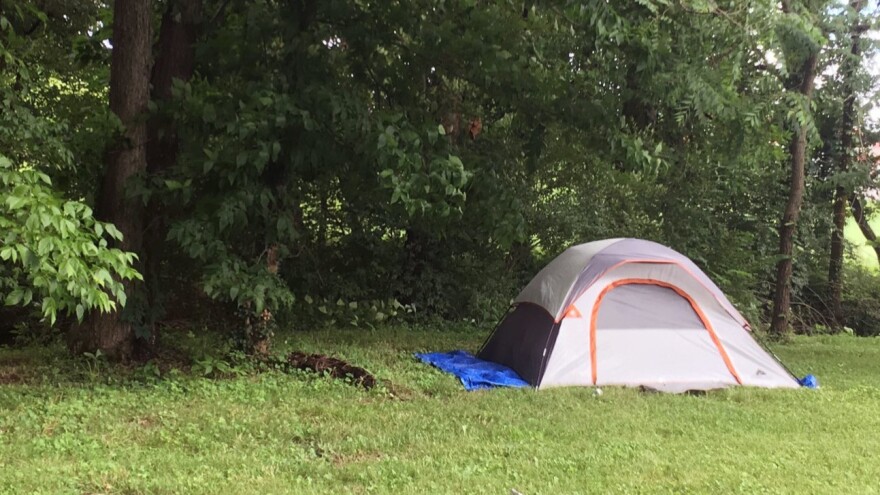ALLENTOWN, Pa. — A group of nonprofit, business and community leaders in Allentown are working to protect people experiencing homelessness from discrimination.
Allentown’s Commission on Homelessness drafted a Homeless Bill of Rights that it hopes City Council will approve this summer.
- Allentown City Council could be set to consider a Homeless Bill of Rights later this year
- The city's Commission on Homelessness proposed the measure again, several years after a similar effort stalled
- The proposed ordinance only seeks to codify that residents without a place to stay maintain all of their rights, the commission's chair said
The Bill of Rights would include provisions guaranteeing those experiencing homelessness maintain their rights despite their living situations, according to commission Chairwoman Abigail Goldfarb.
Those provisions include protecting people’s access to medical care, employment fairness and public spaces; as well as their constitutional rights to personal property, privacy and safety; equal treatment; and housing fairness, she said.
“The purpose is really to say that, even though people don't have a fixed address and they may be sleeping outside or in other unsheltered places, they still have civil rights,” Goldfarb said.
“And those need to be respected and protected.”
We're not certainly asking for an exception for anyone to be given any further rights,” she said. But being homeless “should not be a hindrance for them to enjoy the same rights that the rest of us who have a house.Abigail Goldfarb, Allentown Commission on Homeless chairwoman
The Homeless Bill of Rights in Allentown also is meant to protect residents’ right to vote. People without a fixed address and identification face barriers when they try to cast a ballot, Goldfarb said.
The proposed ordinance is only seeking to codify that residents without a place to stay maintain all of their rights, she said.
“We're not certainly asking for an exception for anyone to be given any further rights,” she said. But being homeless “should not be a hindrance for them to enjoy the same rights that the rest of us who have a house.”
Thousands homeless in Lehigh Valley
The National Law Center on Homelessness & Poverty says homeless bills of rights are “a powerful legal tool” and “a promising new approach to recognizing and protecting the rights of homeless Americans.”
Almost 650,000 people experienced homelessness in the U.S. in 2007, according to the National Alliance to End Homelessness. That total dropped 15% by 2016 but climbed each of the next four years, the organization’s statistics show.
The purpose is really to say that, even though people don't have a fixed address and they may be sleeping outside or in other unsheltered places, they still have civil rights. And those need to be respected and protected.Abigail Goldfarb, chair of Allentown's Commission on Homelessness
The U.S. homeless population included about 580,000 people in 2020, the most recent year for which full data is available due to the COVID-19 pandemic, the NAEH said.
About 12,700 people in Pennsylvania were homeless that year, according to the organization.
A 2019 analysis found 2,249 people experienced homelessness in the Lehigh Valley, with 63% — or about 1,400 people — living in Allentown, according to a presentation the city’s Commission on Homelessness made to Lehigh County officials in 2021.
Almost 1,100 children in Allentown School District experienced homelessness in 2020, the fourth-most of any district in the state, according to the Allentown commission.
Not yet a 'protected class'
The Homeless Bill of Rights was not a response to “any specific instance” of discrimination or violence in Allentown against someone who was unhoused, Goldfarb said.
The commission modeled its draft ordinance on similar legislation passed in several states.
Rhode Island in 2012 was the first state to enact a law explicitly protecting the rights of people experiencing homelessness. Illinois followed a year later, with its legislature approving a homeless bill of rights in 2013.
“It is the longstanding policy of this State that no person should suffer unnecessarily from cold or hunger, be deprived of shelter or the basic rights incident to shelter, or be subject to unfair discrimination based on his or her homeless status,” Illinois’ Bill of Rights for the Homeless Act says.
Connecticut and Puerto Rico also have similar laws on the books.
People experiencing homelessness are not yet a “protected class,” which “really allows for discrimination at times,” Goldfarb said.
Just as people should not be categorized by their race, religion, gender identity or sexual orientation, they “should not be defined by [their] housing status,” Goldfarb said.
She said a Homeless Bill of Rights could spur more support for those without a place to stay in Allentown.
“If the city of Allentown is seeing homeless people as whole people — which is not to infer that they aren't already, but if that is stated and embraced by council — perhaps more programs to support those experiencing homelessness, in the spirit of these rights, would be created and dispersed,” Goldfarb said.
Panhandling, sleeping in public spaces
A similar Homeless Bill of Rights was introduced by Allentown City Council in October 2020 before it stalled later that month.
The council’s Community and Economic Development Committee sent that proposal back to the Allentown Commission on Homelessness because it included “provocative” language in several provisions, Goldfarb said.
The ordinance proposed in 2020 said any person in the city could sit, rest or sleep in public spaces — including in groups. It also granted people the right “to panhandle in public spaces and to communicate to others in reasonable ways for other similar purposes.”
Those provisions are not explicitly included in the newest draft for a Homeless Bill of Rights in Allentown, Goldfarb said.
We don't want anybody to think that what we want to see is people sleeping on the sidewalk and panhandling,. That's not the intention here.Abigail Goldfarb, Allentown Commission of Homeless chairwoman
“We don't want anybody to think that what we want to see is people sleeping on the sidewalk and panhandling,” Goldfarb said. “That's not the intention here.”
But people “should not be harassed” for panhandling because it’s not illegal, Goldfarb said.
“As long as they're behaving within the confines of the law, then this should not be an issue,” she said.
A diverse 'voice for homeless' people
Goldfarb, who serves as executive director of the Lehigh Conference of Churches, works alongside more than a dozen others on Allentown’s Commission on Homelessness.
The commission was established in February 2020 by former Mayor Ray O’Connell to advise city officials on issues affecting homeless and near-homeless populations in Allentown.
The advisory body makes recommendations on ending and preventing homelessness; ensuring “the immediate needs of those experiencing homelessness are met; and educating the public about homelessness," Goldfarb said.
It also serves as a “voice for homeless [people] in the community,” she said.
Allentown’s Commission on Homelessness was modeled on a similar board in Orange County, California. It was established as a 15-member board, but the city’s website currently lists 14 members.
Goldfarb said the commission is a diverse cross-section of Allentown, with nonprofit executives, behavioral health specialists and representatives from local hospitals, businesses, schools and police serving as members.
You have to really, really think about your blind spots. You need a holistic approach, so the goal is really to join competing opinions for the greater good.Abigail Goldfarb, Allentown Commission on Homeless chairwoman
When fully staffed, the board is meant to also include a philanthropic leader, a property owner who works with homeless people, and someone who has “lived experience” of being homeless, Goldfarb said.
The large commission helps ensure that different points of view are considered when trying to address homelessness in Allentown, she said.
“You have to really, really think about your blind spots,” she said. “You need a holistic approach, so the goal is really to join competing opinions for the greater good.”
Though Allentown City Council did not approve a similar Homeless Bill of Rights in 2020, Goldfarb said she still is “really hopeful” the new version will have a different fate.
“I'm really hoping it's the beginning for people experiencing homelessness to let them know that we see them as humans,” she said.


